- Depending on your chosen format for viewing the video you’ll need to either:
- Install your selected monitor onto your dash or preferred location within your cab.
- Remove your current rearview mirror and install the new unit you’ve selected.
- Remove the panels necessary to gain access to your car’s head unit so you can wire your camera appropriately or install your wifi interface module.
3) From there you should be able to test and make sure everything is working as intended. In most cases you’ll want to be sure the system is fully installed before testing your install.
2) Backup Camera Installation Costs
If your camera has bitten the dust you’re likely asking yourself: How much is it to add a backup camera? How much is it going to cost me to replace a backup camera?
The good news is that with an installation like this, any handy person will likely already have most of the necessary tools on hand, and we provide useful extras in our kits like ties and tools to pry parts off.
Backup camera installation cost is often entirely dependent on you! The units themselves can range in price from:
- backup camera. There are always cheaper options out there, but they typically have weaker cables and less weather resistance than our products.
- $100-200 for a universal license plate style backup camera or wifi enabled smartphone backup camera. These are standard workhorse backup cameras that will get the job done.
- Depending on your desired bells and whistles we also have a great selection of high quality:
- Ford OEM Fit Backup Cameras
- GM OEM Fit Backup Cameras
- Toyota OEM Fit Backup Cameras
- Dodge & Chrysler RAM OEM Fit backup Cameras
- Universal Backup Cameras
- Fleet Camera Backup Cameras
- Ag Cameras
As far as time goes, you should budget between 1 to 4 hours to install your backup camera. Your experience and the complexity of your chosen system really determine how long it’ll take. Obviously you don’t want to rush.
Let’s get going so you can see how to plan the installation.
3) Plan for Rear View Camera Installation Success
Listen, this isn’t going to be as simple as it is to backup your camera roll. You’re going to need to think about how you’ll route these cables through your car, and get your hands dirty.
But having a good plan is going to go a long way.
First, you need to decide where you’re going to want to look to see this backup camera.
Installing a display in your dashboard or radio console is a whole different kettle of fish, one of which we will address in a later guide.
For the purposes of this example, we’re going to assume you’ve acquired a rear view mirror kit or one which you can mount on top of your dashboard or to your windshield. There are advantages and disadvantages to both, so we won’t advocate for either here. However, we do recommend that if you’ve bought a kit, use the monitor that comes with it, as that will make things much easier.
Next, you have to ask: Are the provided cables long enough for my car? It’s better to have too much then too little, because you can always trim it down or secure extra wire. With too little wire, you might find yourself out of luck right in the middle of a project. Make a rough measurement from where you’re going to place the camera back to your trunk/license plate area. That will roughly correspond to what you need, and make sure you have a few extra feet just in case. All of which is to say, make sure you chosen kit will actually fit in your car, truck, or SUV. While we include plenty of high quality wire in our kits, you can typically tell a low quality backup camera kit by how much thought went into the connector wires quality.
Before you get started you’ll want read and reread the instructions. Installing a camera should be painless if you know what you’re doing, and have familiarized yourself with the process.
And with that, you should be ready to start your installation. Next, we’ll move on to how to install the backup camera.
4) Sample Wiring Diagrams
Below is an example of what most backup camera installations look like when using monitors:
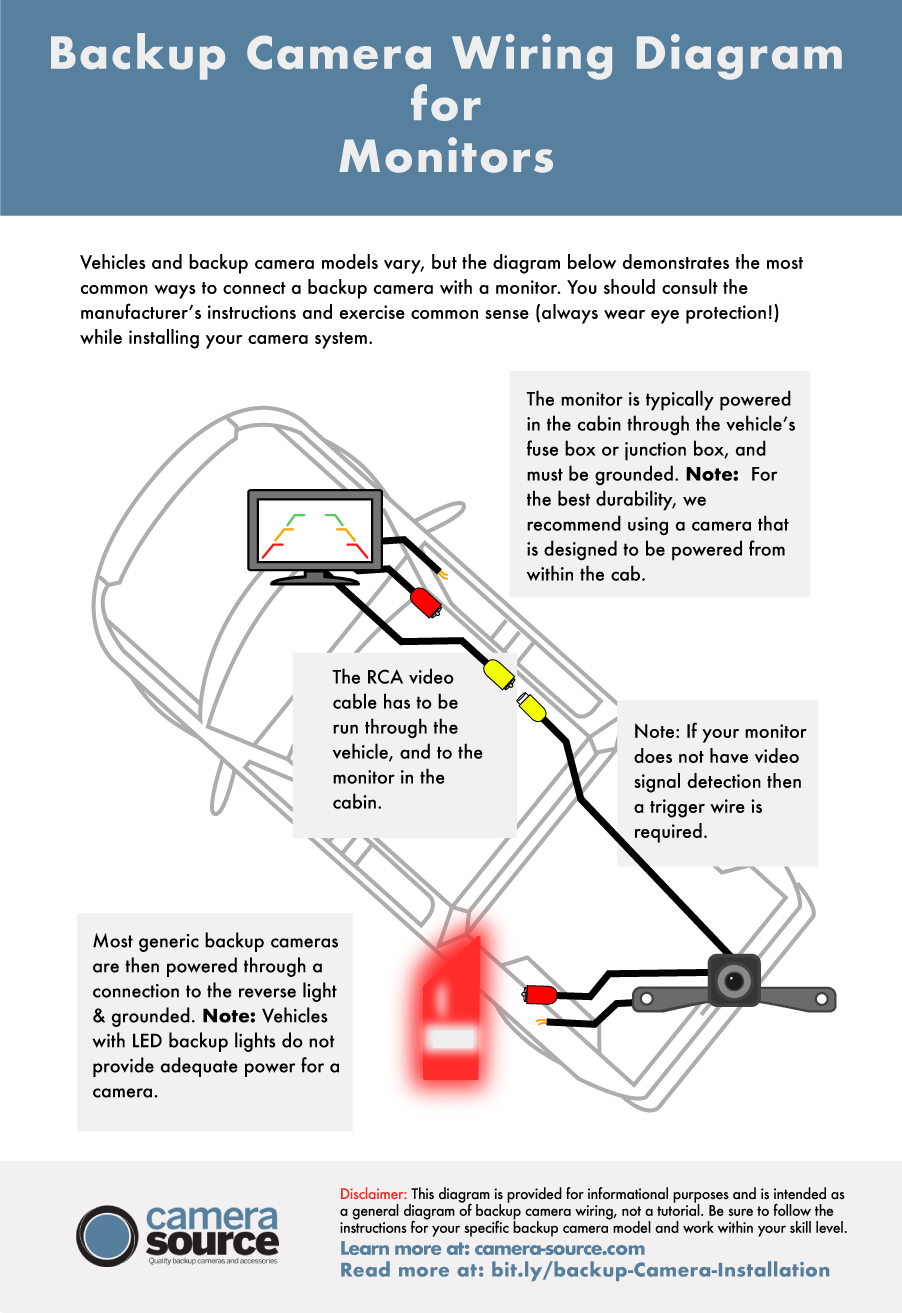
Below is an example of what most backup camera installations look like when using rearview mirror monitors:
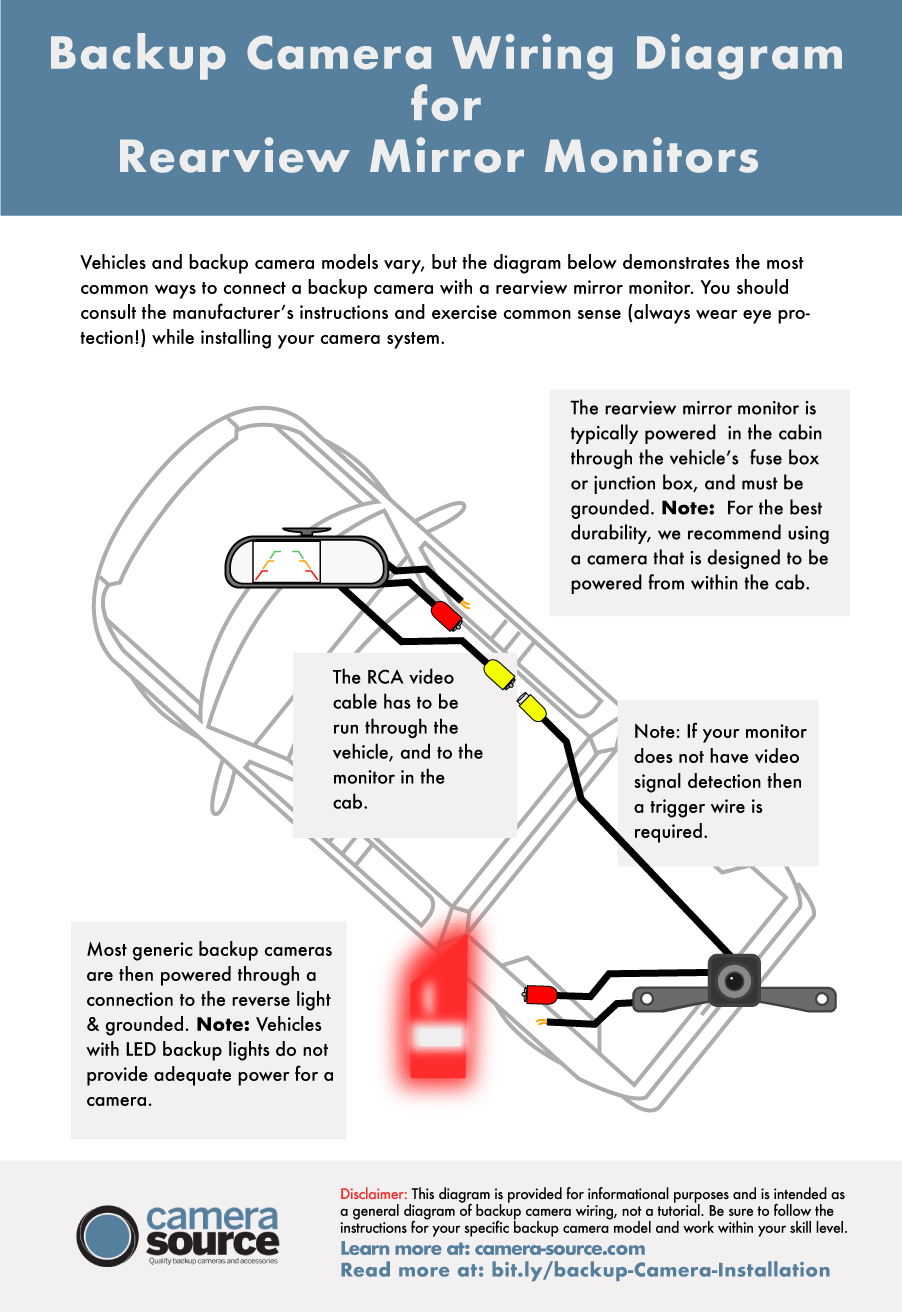
Below is an example of what most backup camera installations look like when using OEM fit components.
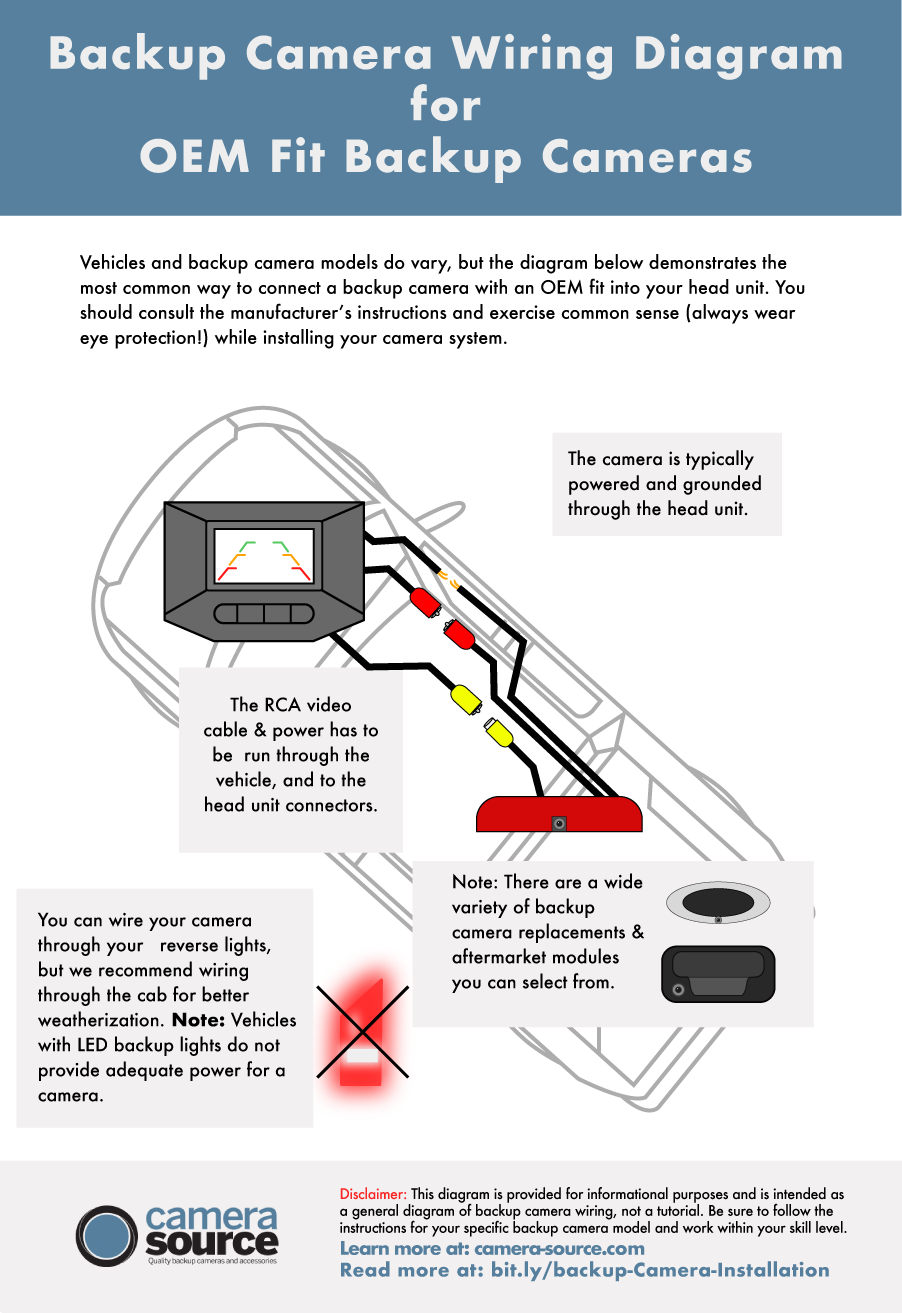
5) Assemble Your Tools and Equipment for Camera Installation
For your tools, you’ll need a power hand drill, an appropriate bit for drilling holes to feed cable, fishing tools can be helpful, and the right size rubber grommet (a cylinder of rubber that will protect the cables from being damaged by the sharp metal edge of the hole you’re going to drill) & ties can keep things secure.
Your backup camera will likely come with the necessary cables (usually camera and monitor female/male RCA cords with connectors for video, power cables, ground wires, and potentially a trigger wire). If not, you’ll probably need to purchase these, and most can be found at a hardware or A/V store. Finally, a crimper or wire stripper will be useful to have on hand.
Ever car and camera kit will be a bit different but generally speaking you should be covered if you have the following tools on hand:
- Hand drill with drill bits for drilling metal (preferable high speed bits coated with titanium oxide)
- Torx set
- Wrench Set
- Safety Goggles
- Flashlights
- Standard wire stripper/crimper
- Torx socket set
- Razor knife
- Socket or nut runner set
- Trim removal tool or small plastic putty knife
- Soldering iron and solder (optional)
- Shrink tube (optional)
Finally, if your kit didn’t come with one, you’ll need to purchase a monitor, but it helps to figure out the next step before doing so.
6) Sample Installations
We’ll include a general walk-through of an install here, but you can also check out some of our specific product guides for installation below.
We have complete installation guides for our products below:
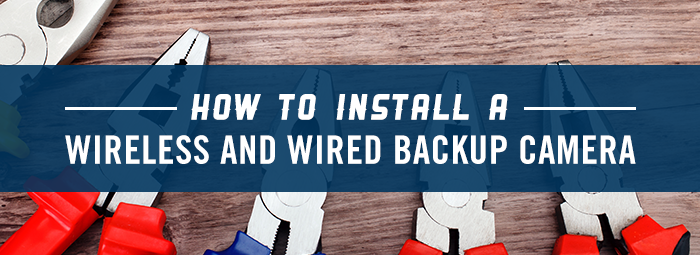
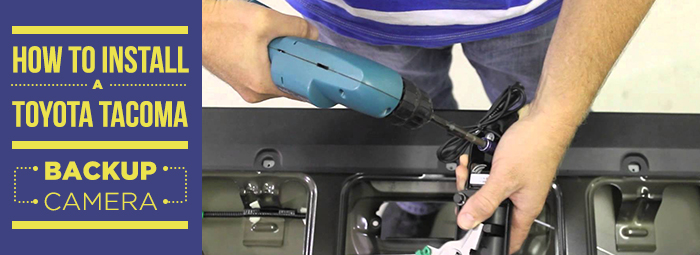
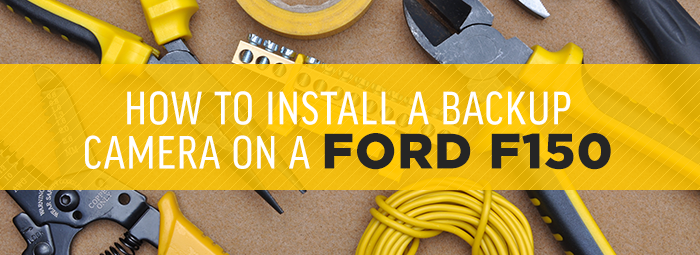
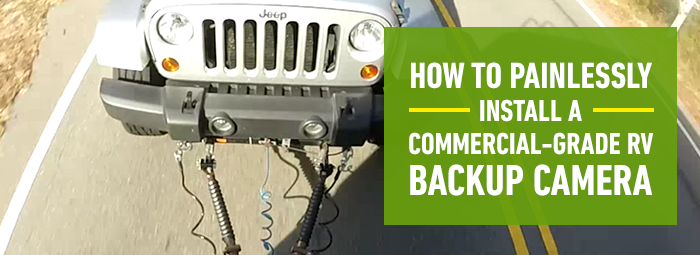
Install Example for a Backup Camera with a Monitor
Your backup camera is most likely going to be installed just above or on your license plate. We’ll start there. Here’s what to do:
- Remove the interior panel of your trunk. This is likely hard plastic or rubber, and you should be able to use a think tool like a flathead screwdriver to pry it off. This won’t break anything, and it will give you a good look at all the cables necessary. Most things can be finessed out, if you’re snapping plastic you’re getting too aggressive during the install.
- Remove your license plate.
- Making sure you’re not going to cut any existing cables, drill a hole from the exterior side of your trunk that will be large enough to run the necessary cables through. You’ll add your license plate back later, but it’s a good idea to make sure that if you’re going to be installing the camera over the plate that you won’t be blocking your license plate number.
- Insert the rubber grommet you bought earlier. Now you’re ready to start running and connecting wires.
Running and connecting wires
Here’s where we start to figure out how to power a backup camera. Let’s go!
- Run the camera and power cable through the hole into the interior of your car.
- Locate the reverse light wires for your car. This is a tricky step, and you want to make sure that you do a good job. This is how to connect a backup camera to the reverse light. Make sure to double check your owners manual to ensure you’ve located the right one.
- Strip the positive and negative wires on your reverse lights (make sure your car is powered off before you do this). Using a small screwdriver, separate some of the strands of the stripped wire, and splice in the power cable for your backup camera to them. Usually you can do this by looping the wires together. Make sure positive is connected to positive and negative is connected to negative. Once you’ve done this, cover everything in electrical tape.
- Connect the RCA cable to the camera’s cable, and run it all from the trunk to the fuse box area at the front of the car. This is usually located to the bottom left of the steering wheel. You can conceal the cable underneath the ceiling panels of your vehicle if you want to peel them back, or if you don’t care about aesthetics, just attach it to the ceiling of your car.
Mount the Monitor
- Next step is mounting your monitor. It may be one that mounts to your rearview mirror, or one that mounts to your dashboard. In either event, following the mounting instructions that come with the device is your best bet. If all else fails, this backup camera installation guidecan be very helpful.
- Connect the RCA cable to the RCA output on the monitor. You may also need to run a trigger wire up to your monitor, or even power it through the same source as the backup camera. (Again models will vary.)
- If the monitor requires it, you’ll likely need to install a fuse tap, which will allow you to connect the bare wiring of your monitor to the power of your fuse box. See the guide linked above for good instructions on how to do this.
Mount the Camera
- Get excited, because we’re on the home stretch. All you need to do now is mount the camera itself to the back of your license plate or trunk, connect the appropriate wires (RCA and power) and you should be ready to go!
7) Testing time
Time for the dry run. Before you reassemble everything in your car, run some different configurations of driving conditions to make sure that the camera is functioning properly. Put your car in reverse to test and make sure that the camera is powering on when it is supposed to, and also test your brakes to make sure you didn’t wire the camera into the wrong cable (you don’t want it coming on every time you pump the brakes).
If you encounter any issues you might want to reference some of our basic support guides like:
- Troubleshooting a backup camera that’s not working
- Troubleshooting a blurry backup camera
- Troubleshooting a foggy backup camera
If you’re experiencing problems, double check the manual and remember that most problems in environments like this come from bad wire splices, bad connections not tying off unused power cables.
Start there, and continue to troubleshoot until you have a functioning backup camera!
Getting the job done right!
Camera Source is your #1 provider of backup cameras and camera solutions. If reading this guide makes you want to install a camera of your own, browse our products, or get in touch with us for more information.